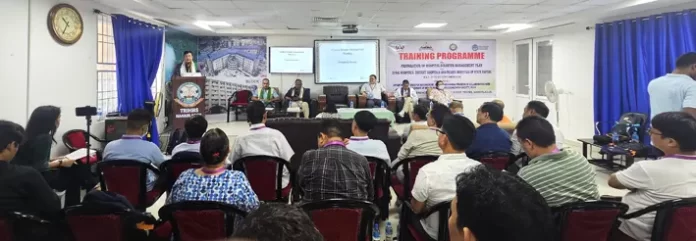Trg prog on hospital disaster mgmt plan
NAHARLAGUN, 19 Sep: A three-day training programme on ‘Preparation of hospital disaster management plan’ for the medical officers (MO) of the TRIHMS, zonal hospitals, major district hospitals, and private hospitals of the Itanagar Capital Region (ICR) began at the TRIHMS here on Thursday.
It is being organised by the disaster management department, in collaboration with the health department and resource persons from New Delhi-based Geohazard Society, in order to train the MOs of the state in preparing hospital disaster management plans to enable the hospitals to respond rationally to disasters and emergencies.
Forty-seven MOs from across the state, including from private hospitals of the ICR, are attending the training programme.
The disaster management minister’s adviser and MLA Nakap Nalo, who inaugurated the programme, expressed concern over the increasing incidences of manmade disasters, especially in the capital region. He emphasised that, “although we cannot stop disasters, better preparedness and planning will help in saving lives of the communities.”
He advised all the deputy commissioners to organise such training programmes in the districts for medical officers, police personnel and other departments. He also requested the TRIHMS to “submit proposals for organising such training programme to the government.”
Earlier, Disaster Management Director Komkar Dulom briefed the gathering on the significance of the training programme.
He highlighted the impacts of climate change, global warming and anthropogenic activities that have increased the incidences of disasters in the state, and stressed on the need for disaster preparedness.
He also pointed out the initiatives of state government “under Pakke Tiger Reserve 2047 Declaration on Climate Change Resilient and Responsive Arunachal Pradesh, where it mandated the disaster management department for preparation of disaster management plans and generating awareness among communities.”
Dulom requested the MOs to prepare “specific hospital disaster management plans of your respective hospitals, and training in incident response system (IRS).”
He advised them to “carry out mock drills regularly in the hospitals, based on the IRS, as it will help in identifying the roles and responsibilities during disasters.”
Geohazard Society Director Dr Hari Kumar spoke on the importance of having a management plan “as incidences of climate change have increased disasters across the country.”
He advised the participants to conduct mock drills at regular intervals to test their hospital disaster management plans.
State Surveillance Officer Dr L Jampa suggested conducting more such collaborative training in disaster response in the future.




